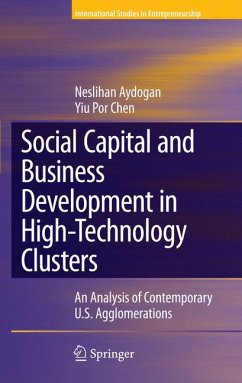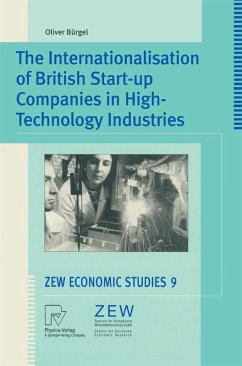
Social Capital and Business Development in High-Technology Clusters (eBook, PDF)
An Analysis of Contemporary U.S. Agglomerations
Versandkostenfrei!
Sofort per Download lieferbar
72,95 €
inkl. MwSt.
Weitere Ausgaben:

PAYBACK Punkte
36 °P sammeln!
Neslihan Aydogan It is now widely accepted that geographical proximity matters to economic and - cial life. Not only does it provide externalities that reduce transaction costs, but it also helps transacting parties form networks from which they can bene t greatly. More than ever, economists have been trying to bridge the development gap between poor and rich regions. Agglomerations are investigated toward that target because economists think that if certain regions can mix up that special formula to conti- ously innovate and produce, then understanding and forming such agglomerations could be...
Neslihan Aydogan It is now widely accepted that geographical proximity matters to economic and - cial life. Not only does it provide externalities that reduce transaction costs, but it also helps transacting parties form networks from which they can bene t greatly. More than ever, economists have been trying to bridge the development gap between poor and rich regions. Agglomerations are investigated toward that target because economists think that if certain regions can mix up that special formula to conti- ously innovate and produce, then understanding and forming such agglomerations could be one way to go about that growth path. We have designed the chapters of this book to work out the mechanics of geographical agglomerations in the United States with the focus of identifying the characteristics of such special formula Chapters 1-3 are designed to investigate the high-tech clusters that have sprung up in the United States due to their innovative capacity to engage in high-val- added activities. The rst question we ask is, What promotes the productivity of high-tech rms? We ask this question by taking into account the region in which a rm is located and the spillover effects of the region on the rm. In particular, we ask if the presence of a variety of industries or of similar industries promotes the productivity of high-tech rms. In this regard, we are interested in distingui- ing the high- and low-tech rms in terms of their driving factors.
Dieser Download kann aus rechtlichen Gründen nur mit Rechnungsadresse in A, B, BG, CY, CZ, D, DK, EW, E, FIN, F, GR, HR, H, IRL, I, LT, L, LR, M, NL, PL, P, R, S, SLO, SK ausgeliefert werden.













